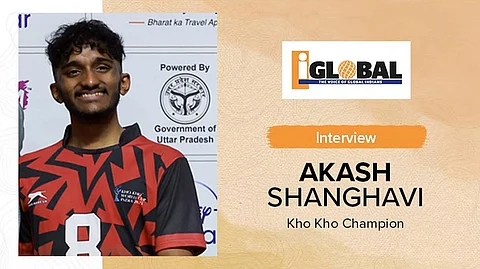Wow, I’m really here: British Indian sports star relives highs of representing Team England in Kho Kho World Cup
At just 22 years old, Akash Shanghavi is balancing a Master’s degree in film production with representing England in one of India’s oldest and fastest-growing sports – Kho Kho. From learning the game through YouTube videos to playing on the international stage in Delhi – where he won the Best Attacker Award twice – Akash’s journey is fuelled by passion, persistence, and a lot of hard work.
As England prepares for one of its biggest national Kho Kho tournaments yet later this month, Shanghavi tells iGlobal all about the big World Cup in Delhi, the future of the sport and advice for young players.
Can you share a bit about yourself?
I'm currently doing a Master's in film production in Manchester. It has always been my passion so I thought ‘why not carry on?’ I started playing Kho Kho at Shaka when I was roughly around 13. At first, I hated it—these uncles kept sprinting past me and I could never catch them! But I’m not one to give up. If I struggle with something, I push myself to get better. I stuck with it and eventually made it onto the England team.
My dad played a bit when he was younger too, so I guess it runs in the family.
How did you get selected for Kho Kho England?
From there, I learned by binge-watching YouTube videos—that’s just how I pick things up. I’d analyse patterns and watch clips of games, especially around 2018–2019 during our Shakha competitions. I also played in my first KKFE (Kho Kho Federation of England) competition in 2018, starting out on the Leicester B team. It was a great learning experience because I got to speak with a lot of former Kho Kho England players.
Then in 2020, they were looking for new players for the England squad, so I messaged our managers, Brij and Rohit, and sent them about 50 clips of me playing Kho Kho. I think I annoyed them into giving me a shot! They finally said, “Just come to trials and we’ll see.”
MORE LIKE THIS…
I still remember that trial clearly – I went with my brother and dad. It was actually the first time I’d ever travelled outside my city, so it felt like a big moment for me.
We had a lot of fun and then at the end of the week, I got a call saying that I’d been picked for England, which was probably one of the best phone calls I've ever had. That was my selection in 2022.
What was it like playing in New Delhi at the first Kho Kho World Cup?
It’s almost impossible to sum up the Delhi experience in one word—I could talk about it for hours. But if I had to, I’d say it was surreal. On a personal level, it was overwhelming in the best way. Representing your country in a sport you love, in the place where it originated—that just hit differently.
There was heat, pressure, noise—everything was on another level. For the team, it was the ultimate test of everything we’d trained for. We’d put in weeks of hard work, hours of practice, and intense recovery sessions.
MORE LIKE THIS…
One of my biggest takeaways was the mental side of it. Just a few months before, in July, I’d suffered a serious knee injury—one of the worst you can get in sport. I was told I’d be out for seven to eight months, and I kept wondering: would I come back? And if I did, would I be the same player?
But I pushed through. And luckily, just before the World Cup, I hit my prime. When we played in that stadium, my mindset was everything. I remember getting someone out and thinking, “Wow, I’m really here.”
Tell us a bit about the upcoming national Kho Kho tournament.
In the UK, we usually play Kho Kho on grass, since there’s no dedicated stadium yet. This year marks the ninth national tournament, and it’s the biggest one so far. The rules have changed—teams now play with six players, including a new wazir role—which has brought in more teams than ever. The tournament’s on Sunday 29th June and might even run over two days.
MORE LIKE THIS…
I’ll be playing for MML (Maharashtra Mandal London), a Wembley-based team and reigning champions for the past three years. I used to play for Shaka Superstars, a team we started ourselves, but I joined MML this year.
It’s great to see so many young players involved too, with separate competitions for juniors, men, and women.

